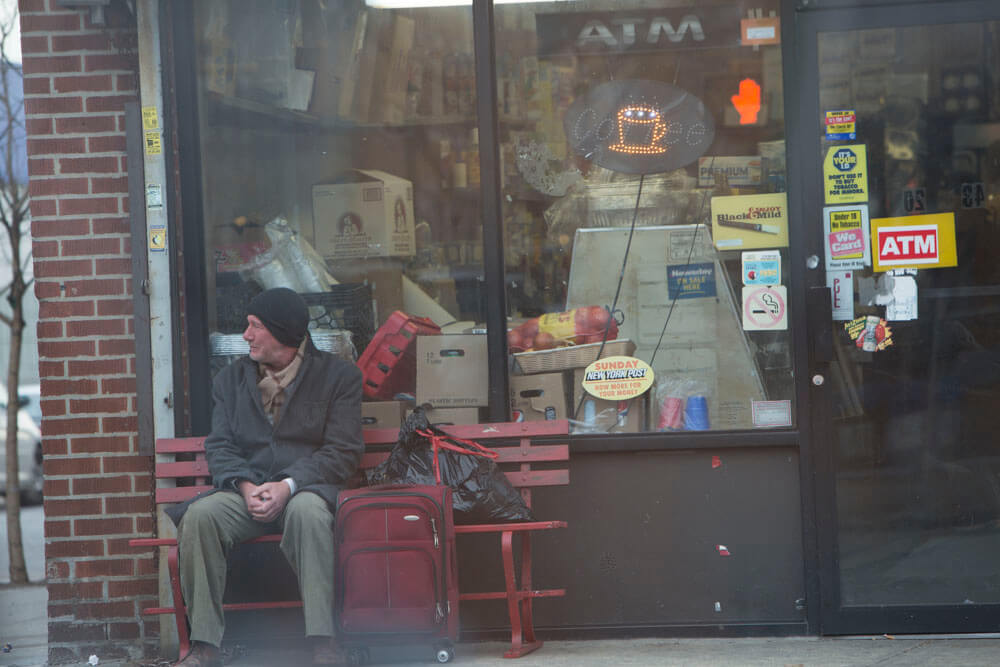‘Time Out of Mind’ He’s first spotted in a bath tub in a deep Brooklyn squatter, as though he was playing a citywide game of hide and seek. George (Richard Gere) doesn’t want to be found, as being found means being ousted from the closest thing he has to a home. When a surly building manager (Steve Buscemi) — the first of many bureaucrats George will encounter who have seen and heard it all before — susses him out, our hero will spend the rest of the film on the opposite quest. He wants to be seen, but he’s stuck on the New York City streets, where being visible is the best way to be hidden, especially if you’re down and out. RELATED: “Sleeping with Other People” both subverts and embraces the rom-com “Time Out of Mind” is a movie about the homeless, but that imparts too much import upon it, and almost certainly implies sentimentality. Movie hobos tend to be holy fools, but George is closer to Mickey Rourke’s Randy “The Ram” in “The Wrestler”: an old-timer has-been with a lifetime of dire mistakes to which the film only ever half-alludes. He even has an estranged, though even angrier, daughter (Jena Malone), who seems to have entirely erased him from her life by the time he makes hesitant but creepy overtures to re-enter it. That plot thread never dominates what remains an episodic character study that moves, if at all, in circles. Usually all he’s trying to do is procure an always skeezy excuse for a bed, along the way picking up brief encounters with lowly nurses and security guards and the like who leave his life as quickly as they entered it. For the most part George is one of the untold invisibles in the city, and filmmaker Oren Moverman (“The Messenger,” “Rampart”) almost treats him that way. Sometimes you have to find him inside busy frames, which are usually shot from a remove or behind glass storefronts or fences. Some of the shots are downright expressionistic: a nighttime scene consisting of a single long shot filmed behind what looks like a neon sign wouldn’t look too out of place in a Hou Hsiao-hsien movie, the images looking like they’ve been speckled in blood. Actors, including many, often cameoing seasoned pros, are shot as though they had no idea the camera was on them, milling about in shots that have more in common with surveillance footage than classical camera setups. It’s an approach Overman has been refining since “The Messenger” that has now reached is possible peak — one where the camera displaces our focus away from our nominal stars and even, in a way, away from humanity itself. Gere, perhaps unexpectedly, fits right in, his pretty face ever so lightly scratched and deepened with wrinkles, his now totally white hair a haphazard buzz job, his beard ditto. In another time, or even from another filmmaker in this time, a Richard Gere homeless man movie would be a tearjerker, begging us to feel for an actor with preternaturally sad eyes that make him impossible to hate. Meanwhile in “Time Out of Mind,” Gere’s character is called out during one of his volatile tete-a-tetes with his daughter for trying to exploit people with his own innate and towering self-pity. George rarely speaks and just barely reacts. It’s a turn of some inevitable movie star show-offing but mostly of doing lots with next to nothing. RELATED: “The Mend” is a hilarious and thrilling look at succumbing to one’s dark side Most of the film’s chatter is of the bureaucratic kind, scene after scene of George very badly trying to articulate his simple needs to figures who can’t help him. Then, for about a half hour, George unwittingly gains a friend: Dixon (Ben Vereen), a fellow vagrant who won’t shut up, even though his new bestie never encourages him. Magnetically played by a stage legend who’s rarely given this kind of chance to work his magic in the movies, Vereen’s Dixon needs to flap his gums to prove his existence but also because that’s all he knows how to do. He talks about his love of jazz, and we’re meant to think of all the great musicians who had peaks and valleys, or even just one peak and endless valleys, where their genius was consumed by bad habits. (Last year’s “Low Down,” with John Hawkes as pianist Joe Albany, would make a nice, very tenuous companion film.) We don’t know how much Dixon is just talking crap, much as we don’t know how much George has hatched a narrative in his head that’s slightly better than the already dark one he actually lived. Instead we just stare and observe, albeit through proverbial cobwebs, those most of the civilized world wouldn’t even treat to a half-decent people-watch. A brief-ish note on the ending (and abandon ship if ye want to be un-spoiled): The ending, in which Malone’s character abruptly runs after her despised father, could be read as an unearned happy ending that mucks with the commitment to grim hyper-realism. It could also be read, I suppose, as a fantasy, namely one George has that gets melded with the film’s text. Or, much more usefully, it could be read as Moverman just not having it in his heart to let George’s remaining days be one of aimless, lonely wandering, his existence forgotten by absolutely everyone. Noel Murray made a similar claim about the ending of Don Hertzfeldt’s brilliant animated short “World of Tomorrow,” which makes an abrupt segue from unbelievable despair to (sort of, in a way) happiness that seemed as though Hertzfeldt had played deux ex machina himself, just because even he couldn’t bear to see his protagonist suffer so. Something similar could be said to happen here, and given the muck he’s dragged George through for 99 percent of the length, Moverman, like George, has earned something nice.
Director: Oren Moverman
Stars: Richard Gere, Ben Vereen
Rating: R
4 (out of 5) Globes
‘Time Out of Mind’ is a detached study of homelessness and Richard Gere

IFC Films
Follow Matt Prigge on Twitter @mattprigge


















